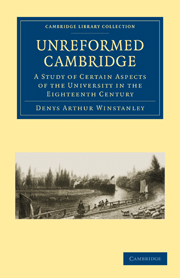Summary
As this book does not in any way claim to be a history of the University in the eighteenth century, no apology is, perhaps, required for the omission or cursory treatment of several important events in the academic life of that age. Nothing more has been attempted than to survey certain activities and inactivities, mainly educational, of the University at that time, and to explain how it came about that the inactivities loom so large in the story. But, unfortunately, it has been found impossible to perform this task, even inadequately, without entering into a good deal of rather wearisome detail; and it can only be hoped that such minutiae as the requirements of long-forgotten statutes will be recognised as a regrettable necessity and not censured as a wilful indulgence. For if we are to measure the extent to which our predecessors in the University fell short of their calling, we must at least know to what they were called.
Use has been made of the Cole, Newcastle and Hardwicke manuscripts in the British Museum, and it may be worth while to mention that the letters of Dr Plumptre, President of Queens’, which are among the Hardwicke manuscripts, have been found extremely valuable. Dr Plumptre played a very active part in academic life, and as he was Rector of Wimpole, it naturally fell to him to keep Lord Hardwicke, the High Steward, informed about University affairs. He performed this duty very thoroughly and competently, and, as his letters have been preserved, Lord Hardwicke is not his only beneficiary.
- Type
- Chapter
- Information
- Unreformed CambridgeA Study of Certain Aspects of the University in the Eighteenth Century, pp. v - viPublisher: Cambridge University PressPrint publication year: 2009First published in: 1935

